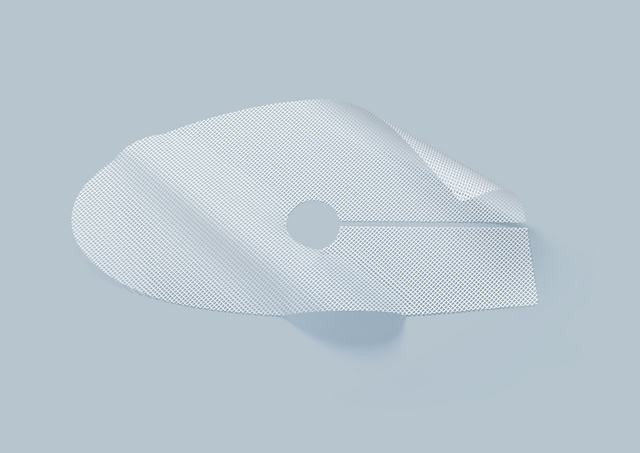TiLENE® Inguinal

Benefits
Body compatibility
Titanium’s body compatibility properties transferred to a hernia mesh
Quality of life
Improved quality of life for patients1
Handling
Easier handling and excellent visibility
Standardisation
With TiMESH/TiLENE® there is one mesh for every hernia indication (incl. IPOM)
No effect on diagnostics
Imaging diagnostics are not affected.
[1] Horstmann R., Hellwig M., Classen C., Röttgermann S., Palmes D., Impact of polypropylene amount on functional outcome and quality of life after inguinal hernia repair by the TAPP procedure using pure, mixed, and titanium-coated meshes. World J Surg, 2006, 30(9): 1742-1749
Product Details
- Monofilament fabric
- Laser cut atraumatic edges
- Non-absorbable
- EO-sterilised (ethylene oxideEthylene oxide is a gas used as disinfectant for organic insulation (wool, plant fibres), textile fibres, and medical devices and products.), pyrogen-free
Technical Data
- Material: Titanised type 1a polypropylene mesh
- Pore size: 1 mm
Knowledge
Highest demands on the material
In addition to the skills of the surgeon, the quality of the mesh material determines the quality of a lasting and anatomically stable hernia repair. TiMESH mesh implants are made of Type 1a polypropylene mesh (macroporous & monofilament)1 with a titanised, hydrophilic surface. Compared to simple polypropylene, this offers a number of advantages, which are already known in the use of titanised mesh implants for hernia surgery, such as:
- better cell growth2
- lower risk of inflammation3
- less scarring3
- less shrinkage of the mesh4
[1] Klinge et al. Modified classification of surgical meshes for hernia repair based on the analyses of 1,000 explanted meshes. Hernia (2012) 16: 251–258
[2] Lehle K. Lohn S., Verbesserung des Langzeitverhaltens von Implantaten und anderen Biomaterialien auf Kunststoffbasis durch plasmaaktivierte Gasphasenabscheidung (PACVD), Abschlussbericht Forschungsverbund “Biomaterialien (FORBIOMAT II)”, 149–173, 2002
[3] Scheidbach et al. In vivo studies comparing the biocompatibility of various polypropylene meshes and their handling properties during endoscopic total extraperitoneal (TEP) patchplasty. Surg Endosc (2004) 18: 211–220
[4] Scheidbach et al. Influence of Titanium Coating on the Biocompatibility of a Heavyweight Polypropylene Mesh. Eur Surg Res 2004; 36: 313–317
Application area
- Inguinal hernias
Manufacturer
- pfm medical titanium gmbh, Südwestpark 42, 90449 Nuremberg, Germany
Ordering Information
| Article number | Product weight | Size | Delivery unit (VPE) |
|---|---|---|---|
| 6000643 | 35 g/m² | 15 cm x 12 cm | 3 pcs |
| 6000644 | 35 g/m² | 15 cm x 12 cm | 3 pcs |
| 6000648 | 65 g/m² | 10 cm x 4,7 cm | 3 pcs |
| 6000954 | 35 g/m² | 11 cm x 5,7 cm | 3 pcs |
Downloads
Instructions for use can be found in our Download Center.
Additional information

Please note:
Not all products are available in every country.
Please refer to the respective country websites:
For all other countries please use the contact form to enquire about availability for your country.